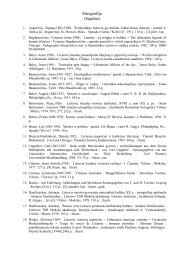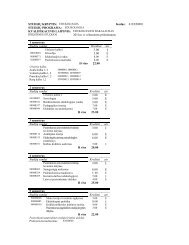2013,1 (62) - KlaipÄdos universitetas
2013,1 (62) - KlaipÄdos universitetas
2013,1 (62) - KlaipÄdos universitetas
Create successful ePaper yourself
Turn your PDF publications into a flip-book with our unique Google optimized e-Paper software.
Anne Koskiniemi, Juha Perttula<br />
is important to know how people interpret perceived information and associate new<br />
information with former knowledge (Ashford, Blatt & VandeWalle, 2003).<br />
Feedback studies from a recipient's viewpoint have focused on the impacts of leader-member<br />
exchange on communication satisfaction (Mueller & Lee, 2002), feedback<br />
orientation (Dahling, Chau & O'Malley, 2010; Linderbaum & Levy, 2010) feedback<br />
received from supervisors (Berlin, 2008; Chakrabarty et al., 2008), the effects of<br />
self-regulatory strategies on feedback (Oettingen et al., 2012) and associations of<br />
feedback with students’ performance and self-evaluation (Plakht, Shiyovich, Nusbaum<br />
& Raizer, 2012). Furthermore, feedback environments that emphasize informal aspects<br />
over formal ones have been reformed (Steelman et al., 2004), and connections<br />
between feedback environment, seeking feedback (Whitaker, 2011) and behaviour in<br />
organizations (Peng & Chiu, 2010) have been studied.<br />
The focus of this study on received positive feedback is derived from our everyday<br />
observation that people interpret it very differently. Consequently, the effects of given<br />
positive feedback may vary a lot. Furthermore, we found it interesting to study interpretations<br />
of positive feedback among those employees who work as leaders even<br />
though they do not have a formal managerial position in the organization. They are<br />
often called team leaders. A team leader is an employee who is responsible for varied<br />
information exchange between managers and team members. A team leader is chosen<br />
by the team itself for a period of time.<br />
The purpose of this study is to understand how employees who do not hold a formal<br />
managerial position in their organization interpret receiving positive feedback.<br />
The aim is to describe the core meanings of team leaders’ experiences in receiving<br />
positive feedback in their everyday work. The research question is: How do team leaders<br />
in a public organization experience the positive feedback they have received in<br />
their current work?<br />
The theoretical definition of positive feedback was not established before performing<br />
the empirical study because our interpretation of positive feedback considers it to be subjectively<br />
experienced. Moreover, being consistent with the research design, we requested<br />
that team leaders themselves identify the situations in which they have experienced receiving<br />
positive feedback at work. Nevertheless, two restrictions for work situations were set:<br />
they must belong to their present work, and the source of positive feedback had to be either<br />
from members or outer stakeholders of the current organization.<br />
An existential-phenomenological approach was adopted as a methodological frame.<br />
The existential dimension makes it adequate to figure out a team leader’s personal<br />
experience in their actual work setting. Phenomenology is included because of our<br />
interest in general experiential knowledge among team leaders. The use of empirical<br />
phenomenology allows general meanings or structures of participants’ personal<br />
experiences to be grasped and described (Giorgi, 2009; Perttula, Väänänen, Malinauskas,<br />
Gudliauskaite-Godvade & Godvadas, 2010). The research material was gathered<br />
by open interviews, which is one relevant way to collect empirical data when applying<br />
an existential-phenomenological methodology. The use of an existentialphenomenological<br />
approach and the related empirical methods has been lacking in<br />
previous feedback research.<br />
60

















